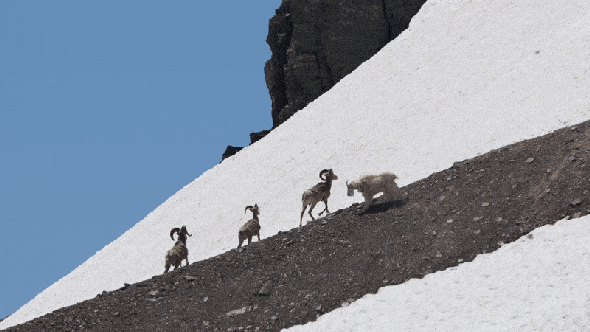As Ice Melts on U.S. Mountains, Sheep and Goats Battle Over Resources
the goats are winning.

 Why you can trust us
Why you can trust us
Founded in 2005 as an Ohio-based environmental newspaper, EcoWatch is a digital platform dedicated to publishing quality, science-based content on environmental issues, causes, and solutions.
Scientists studying over 1,500 miles of the Rocky Mountains have documented competition between mountain goats and bighorn sheep. The competition is over resources that are being uncovered as glaciers melt. A newly released study documents these previously unknown conflicts and shows that most of the time, the goats are winning.
The Wildlife Conservation Society (WCS), Colorado State University and the National Park Service are responsible for the study, which reviewed a 1,500-mile span of the U.S. Rocky Mountains. As glaciers melt, more minerals, including salt licks and potassium deposits, are being exposed, and the mammals compete over access to these resources. The study was published in the journal Frontiers in Ecology and Evolution.
“While humans continue to be justifiably concerned about the climate-induced havoc we’re wreaking planet-wide, much has remained unknown about species aggression among our mammalian brethren” said Joel Berger, lead author of the study, senior scientist for WCS and the Barbara Cox-Anthony Chair of Wildlife Conservation at Colorado State University.
Scientists were surprised to find that among the conflicts, the goats won more often than bighorn sheep. Mountain goats won more than 98% of battles at three sites from Colorado to Alberta, Canada.
“We were surprised that mountain goats won,” Berger told the Washington Post. “Naively, I was just thinking, we’ve got two similar-sized species and they both live in these mountains. And if everything was equal, then half the time we’d expect one to win and half the time the other.”
While mountain goats are native in the northwestern U.S., they are not native to Colorado and Wyoming. The observations bring concerns that the mountain goats may outcompete the native bighorn sheep.
Scientists suspect melting glaciers that expose resources are part of the problem, but the interactions may also be driven by human activity, like building roads and artificial sources of water that restrict natural resources for the animals.
“If we can’t offer species other than ourselves a chance, we’re just cooking our fates along similarly destructive paths,” Berger said in a statement.
As reported by The Guardian, the Rocky Mountains have lost over 300 glaciers over the past 100 years. NASA’s Earth Observatory shared that by 2030, most of the glaciers in Glacier National Park will no longer be visible. These ongoing and rapid changes due to global warming could further impact species in these mountainous habitats.
“Not long ago these areas were covered in ice and snow. They’ve now opened up and there’s some conflict over access,” Berger told The Guardian. “Direct conflict isn’t something any of these species want, but this is what happening.”
Subscribe to get exclusive updates in our daily newsletter!
By signing up, you agree to the Terms of Use and Privacy Policy & to receive electronic communications from EcoWatch Media Group, which may include marketing promotions, advertisements and sponsored content.

 233k
233k  41k
41k  Subscribe
Subscribe 




